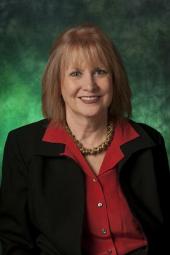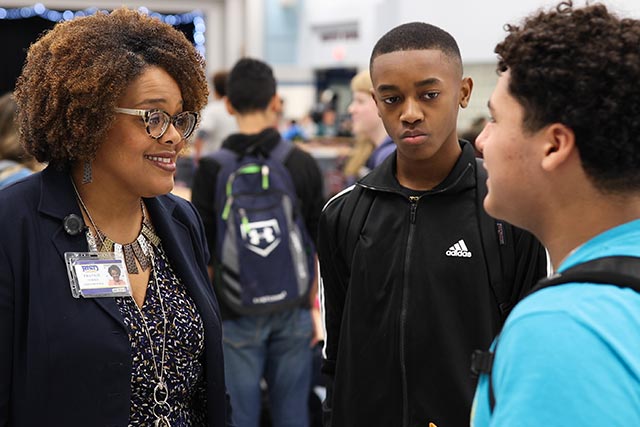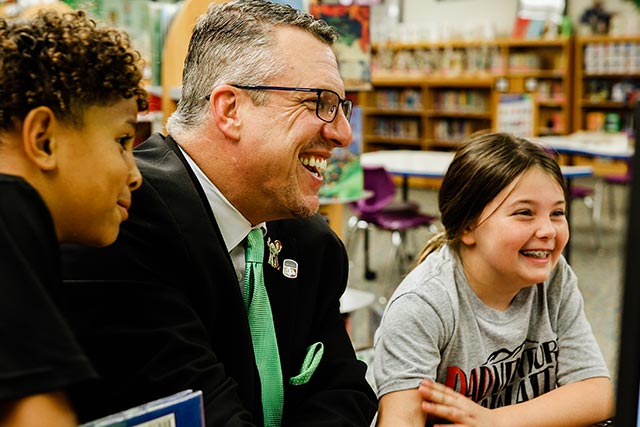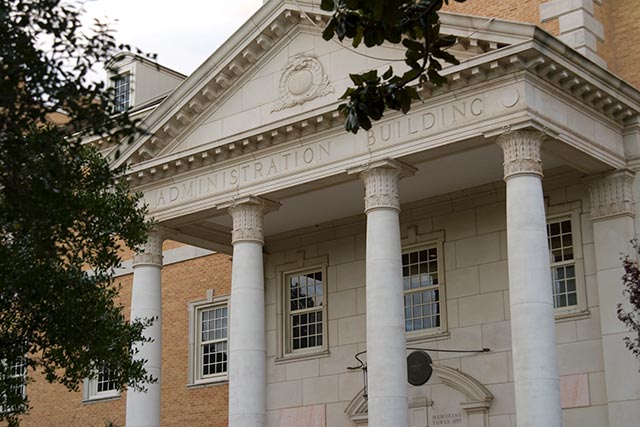Barbara Pazey
Faculty, Teacher Education and Administration
Associate Professor
Matthews Hall 218-L

Barbara L. Pazey is an Associate Professor of Educational Leadership at the University of North Texas, where she joined the faculty in 2017. She received her Ph.D. in Educational Administration with a specialization in Special Education Administration from The University of Texas at Austin, her Master of Arts in Music and Piano from The Ohio State University, her special education certification through the University of South Carolina and Francis Marion University, and a Bachelor of Music degree with a major in piano from Muskingum University. She has experience as a K-12 special education and music teacher, musician and music director for several professional organizations, high school inclusion coordinator, high school principal, and higher education administrator.
Pazey’s research agenda pursues four lines of inquiry: student and adult voice and the importance of facilitating the empowerment of student and adult voice, particularly among individuals across multiple generations and identities; ethically and equity-oriented teacher and school leadership and leadership preparation; education policy, law, and reform; and inclusive education. She interrogates the effects of education and related policies, laws, and reforms on the experiences of student and adult populations and examines how those policies, laws, and reforms inform and impact the development of ethically and equity-oriented leaders and leadership preparation programs. Much of her work focuses on topics focused on special education and individuals with disabilities.
Pazey actively participates in several professional organizations, serving as a member of the Action Committee for the Leadership for Social Justice Special Interest Group (SIG) for the American Educational Research Association (AERA). She is currently working on a research project related to school leaders’ values, beliefs, and mindsets about ability and capability as inclusive leaders and an international research project regarding inclusive school leadership within schools relevant to educational policy. She also participates as a member of the Council of Exceptional Children, the Council of Administrators of Special Education, and the University Council of Educational Administration.
Pazey, B. L. (forthcoming). Student voice. In “Bodies and Different Abilities.” The Bloomsbury Encyclopedia of Social Justice in Education.
Pazey, B. L., Wang, P., Miles, A. J., & Black, W. R. (2026). Principals' efforts to create and foster an inclusive school culture: Pragmatic approaches in fast-growth school environments. Education Sciences, 16(1), 66. https://www.mdpi.com/2227-7102/16/1/66
Johnson, K. R., & Pazey, B. L. (2025). Lessons learned from the experiences of university students with autism prior to and during COVID-19: Implications for higher education. Journal of Postsecondary Education and Disability, 38(4), 655-670.
Wilshire II, J., Voelkel, Jr., R. H., Pazey, B., & van Tassell, F. (2025). Inclusive professional learning communities and special education collaboration: A qualitative case study in Texas. Education Sciences, 15(10), 1279, 1-24. https://www.mdpi.com/2227-7102/15/10/1279
Rice, M., & Pazey, B. L. (2025). Ensuring IDEA implementation for students with disabilities across instructional modalities. Management in Education, 39(3), 118-126. https://doi.org/10.1177/0892020622110
Frick, W.C., & Pazey, B.L. (2024). Approaching a substantive theory of moral reckoning in special education leadership: Innovative grounded theory methods using extant data on principals. International Journal of Education Research. https://www.sciencedirect.com/science/article/pii/S266374024000803
Okilwa, N.S., Pazey, B.L., & Barnett, B.G. (2024). The personal and professional reflections of three Texas high school administrators during the COVID-19 pandemic. In S. Hardie, H. Goode, & D. Gurr (Eds.), Leading schools through the pandemic and beyond: Findings from principals in seven countries (pp. 193-214). Information Age Publishing.
Pazey, B. L. (2024). Successes, challenges, and hopes of an educational leadership program coordinator: Balancing the self and others. In N. A. Paufler & E. H. Reames (Eds.), Navigating the ubiquitous, misunderstood, and evolving role of the educational leadership program coordinator in higher education (pp. 135-157). Information Age Publishing.
Pazey, B. L., Eddy, C. M., & Bump, K. W. (2024). Applying an equity framework to develop inclusive visions of STEM teaching and leading: Honoring the voices of students with dis/abilities. Action in Teacher Education, 46(1), 75-93. https://doi.org/10.1080/01626620.2023.2290250
Pazey, B. L., King, K., & van Tassell, F. (2023). Everybody is somebody at Johnston: The irony of integrated excellence in Austin, Texas. American Educational History Journal, 50(1/2), 153-170.
Leader, J., A., & Pazey, B. L. (2023). More than a test score: Toward a more balanced school accountability system. School Leadership Review, 17(2), Article 5. https://scholarworks.sfasu.edu/slr/vol17/iss2/4/
Paufler, N., Ezzani, M., Viamontes, J., Murakami, E., & Pazey, B. L. (2022). Educational leadership doctoral program evaluation: Student voice as the litmus test. Journal of Research on Leadership Education, 17(3), 215-242.
Pazey, B. L. (2021). Incorporating the voices and insights of students with disabilities: Let’s consider our approach. International Journal of Student Voice. https://ijsv.psu.edu/volume-8/
Pazey, B. L., & Combes, B. (2020). Principals’ and school leaders’ roles in inclusive education. In Oxford Research Encyclopedia of Education. Oxford University Press. https://doi.org/10.1093/acrefore/9780190264093.013.1215
Pazey, B. L. (2020). !Ya basta! Countering the effects of neoliberal reforms on an urban turnaround high school. American Educational Research Journal, 57(4), 1868–1906. https://journals.sagepub.com/doi/abs/10.3102/0002831219886530?journalCode=aera&
Pazey, B. L., & DeMatthews, D. (2019). Student voice from a turnaround urban high school: An account of students with and without dis/abilities leading resistance against accountability reform. Urban Education, 54(7), 919-956. https://journals.sagepub.com/doi/10.1177/0042085916666930
Pazey, B. L., & Yates, J. R. (2019). Conceptual and historical foundations of special education administration. In J. Crockett, B. Billingsley, M. L. Boscardin (Eds.), Handbook of leadership in special education (2nd ed., pp. 18-38). Routledge.
Pazey, B. L., & Lashley, C. (2018). Supporting socially just, equitable, and Inclusive schools. In L. Bass, W. C. Frick, & M. D. Young (Eds.), Developing ethical principles for school leadership: PSEL standard two (pp. 115-145). Routledge.
Decker, J. R., & Pazey, B. L. (2017). Case-based instruction to teach educators about the legal parameters surrounding the discipline of students with disabilities. Action in Teacher Education, 39(3), 255 273. https://www.tandfonline.com/doi/full/10.1080/01626620.2017.1292160
DeMatthews, D., Pazey, B. L., & Gregory, B. (2017). Are students with disabilities being denied special education in Texas? Teachers College Record.https://www.tcrecord.org/content.asp?contentid=21804
Pazey, B. L., Cole, H. A., & Spikes, D. (2017). A single voice in the crowd: A case study of one student’s determination to challenge top-down school reform. Teachers College Record, 119(5), 1-37.
Guerra, P. L, & Pazey, B. L. (2016). Transforming educational leadership preparation: Starting with ourselves. The Qualitative Report, 21(10), 1751-1784. http://nsuworks.nova.edu/tqr/vol21/iss10/2/?utm_source=nsuworks.nova.edu%2Ftqr%2Fvol21%2Fiss10%2F2&utm_medium=PDF&utm_campaign=PDFCoverPages
Pazey, B. L., Schalock, R. L., Schaller, J., & Burkett, J. (2016). Incorporating quality of life concepts into educational reform: Creating real opportunities for students with disabilities in the 21st century. Journal of Disability Policy Studies, 1-10. https://doi.org/10.1177/1044207315604364
Sledge, A., & Pazey, B. L. (2016). Teacher evaluation in the special education setting: Voices from the field. Texas Education Review, 4(1), 17-46. https://review.education.utexas.edu/volume-4-issue-1/
Waitoller, F., & Pazey, B. L. (2016). Examining competing notions of social justice at the intersections of high-stakes testing practices and parents’ rights: An inclusive education perspective. Teachers College Record. 118(4).
Ji, E., Schaller, J., Pazey, B. L., & Glynn, K. (2015). Education and employment outcomes from the RSA data file for transition-age African American, White, and Hispanic youth with learning disabilities. Journal of Applied Rehabilitation Counseling, 46(3), 15-24.
Pazey, B. L., & Cole, H. (2015). Tensions and transformations: Using an ethical framework to teach a course on disability law to future educational leaders. Journal of School Leadership, 25(6), 1130- 1168.https://doi.org/10.1177%2F105268461502500605
Pazey, B. L., Vasquez Heilig, J., Cole, H. A., & Sumbera, M. (2015). The more things change, the more they stay the same: Comparing special education students’ experiences of accountability reform across two decades. The Urban Review, 47(3), 365-392. https://doi.org/10.1007/s11256-014-0312-7
Flower, A., McKenna, J., Haring, C., & Pazey, B. L. (2015). School-to-life transition: Perceptions of youth in behavior intervention programs. Preventing School Failure: Alternative Education for Children at Risk, 59(4). 217-226. https://doi.org/10.1080/1045988X.2014.917602
Williams, J. L., Pazey, B. L., Fall, A. M., Yates, J. R., & Roberts, G. J. (2015). Avoiding the threat: An exploratory study into a theoretical understanding of the de facto segregation of students with disabilities. NASSP Bulletin, 99(3), 233-253. https://doi.org/10.1177/0192636515601491
Bineham, S., Shelby, L., Pazey, B. L., & Yates, J. R. (2014). Response to intervention: Perspectives of general and special education professionals. Journal of School Leadership, 24(2), 230-252. https://doi.org/10.1177%2F105268461402400201
Hamilton, M, Vasquez Heilig, J., & Pazey, B. L. (2014). A nostrum of school reform? Turning around reconstituted urban Texas high schools. Urban Education, 49(2), 182-215. https://doi.org/10.1177/0042085913475636
Pazey, B. L., Gevarter, C., Hamrick, J., & Rojeski, L. (2014). Administrator views and knowledge related to intervention and instructional practices for students with autism spectrum disorders. Research in Autism Spectrum Disorders, 8(10), 1253-1268. https://www.sciencedirect.com/science/article/abs/pii/S1750946714001482?via%3Dihub
Sumbera, M. J., Pazey, B. L., & Lashley, C. (2014). How building principals made sense of free and appropriate public education in the least restrictive environment. Leadership and Policy in Schools, 13(3), 297-333. https://doi.org/10.1080/15700763.2014.922995
Sorrells, A. M., Cole, H. A., Pazey, B. L., & Faith-Carter, J. (2014). Working with learners with learning disabilities in STEM. In S. Green (Ed.), S.T.E.M. education: Strategies for teaching learners with special needs (pp. 53-65). Nova Science Publishers.
Pazey, B. L., & Cole, H. (2013). The role of special education training in the development of socially just leaders: Building an equity consciousness in educational leadership programs. Educational Administration Quarterly, 49(2), 243-271. https://doi.org/10.1177/0013161X12463934
Pazey, B. L., & Cole, H. (2013). The role of special education training in the development of socially just leaders. In M. Grogan (Ed.), The Jossey-Bass reader on educational leadership (3rd ed.). pp. 166-193. Wiley.
Salazar, M. J., Pazey, B. L., & Zembik, M K. (2013). What we’ve learned and how we’ve used it: Learning experiences from the cohort of a high-quality principalship program. Journal of Research on Leadership Education, 8(3), 304-329. https://doi.org/10.1177/1942775113502021
Sledge, A., & Pazey, B. L. (2013). Measuring teacher effectiveness through meaningful evaluation: Can reform models apply to general education and special education teachers? Teacher Education and Special Education, 36(3), 231-246. https://doi.org/10.1177/0888406413489839
Williams, J., Pazey, B. L., Shelby, L., & Yates, J. R. (2013). The enemy among us: Do school administrators perceive students with disabilities as a threat? NASSP Bulletin, 97(2), 139-165. https://doi.org/10.1177/0192636512473507
Pazey, B. L., & Cole, H. A., & Garcia, S. B. (2012). Toward a framework for an inclusive model of social justice leadership preparation: Equity-oriented leadership for students with disabilities. In C. Boske & S. Diem (Eds.). Global leadership for social justice: Taking it from the field to practice (pp. 193-216). Emerald.
Reyes, P., & Pazey, B. L. (1999). Creating student-centered classroom environments: The case of mathematics. In P. Reyes, J. D. Scribner, & A. Scribner (Eds.), Lessons from high-performing Hispanic schools: Creating learning communities (pp. 94-130). Teachers College Press.
Pazey, B. L. (1995). An essential link for the administration of special education: The ethic of care. Journal for a Just and Caring Education, 1(3), 296-310.




